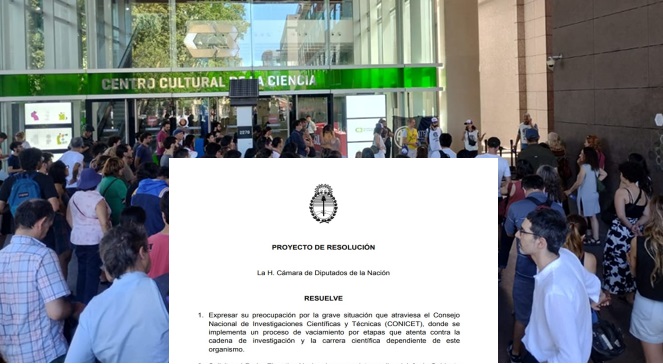
This Wednesday, the board of directors of the National Scientific and Technical Research Council of Argentina – CONICET, ratified the adjustment policy that veterinarian Daniel Salamone came to lead the organization, representing the Executive Branch. According to the board’s resolution, only 600 doctoral scholarships would be awarded this year, when the 2023 call had been for 1,300 people, and the start of the programs will be postponed for at least four months, from April to August.
Hundreds of teachers, scholarship holders and researchers demonstrated again today in this context. The university professor and national representative Christian Castillo approached there, who said that for this reason he presented in the National Congress, a draft resolution that requests reports from the Executive Branch on everything that has been done up to the moment in science and technology.
Request for reports
The project presented under file 5332-D-2023 calls on the Chief of the Cabinet of Ministers and the Conicet authorities designated by him (Decree No. 102/2023), “to appear before this Chamber and the corresponding commissions in order to report in detail about the situation and plans of the current management regarding the continuity of scholarships, research projects, jobs, salary updates, budget and other related issues of vital importance for the scientific and technological development of the country.”
It is that, as the project supported by Myriam Bregman, Nicolás del Caño, Alejandro Vilca and Romina Del Plá of the Left Front and the representative Ana María Ianni of Unión por la Patria, the organization, which is the most important in the country and one of the main ones in the entire region, is experiencing a rapid process of emptying, full of irregularities.
Castillo explains that “to the precarious situation that it was already going through under previous administrations, this year was added the direct attack of the new management of Javier Milei.” The text presented, which can be read in full below, also adds that “with the freezing of the 2023 budget in all state levels, its operation in institutes and universities, as well as the concrete, practical tasks of research, are directly affected,” He adds, and highlights that even different university authorities and research organizations have been warning that this budget restriction would not allow them to maintain their activities beyond June of this year.
As the organization’s researchers and scholarship holders have been denouncing since the beginning of January, this budgetary suffocation is compounded by the abrupt cut in research scholarships for 2023 and in income for the research career; wages owed; the impact of the devaluation on scientific works that demand imported inputs; the dismissal of the administrative staff that supports the operation of CONICET in various headquarters and scientific and technological centers. As the deputies denounce, this even jeopardizes the continuity in a short period of time of the staff of 11,000 researchers, 12,000 scholarship holders, 3,000 technicians, 2,000 administrative staff and more than 300 centers and institutes throughout the country that comprise it.
“This attack on CONICET is part of a policy of adjustment to more general scientific and technical production,” says Castillo, and warns that “it seeks to bring one of the most important research institutions in Latin America to such a state of emptying.” , which will not need to be closed. Along with this, the cancellation of the Conicet doctoral scholarships will practically imply the disappearance of the highest degree in our country, so that only those who can support themselves or have a scholarship from another organization would be able to access doctorates, an issue that is practically non-existent.”
The interest in the emptying of CONICET, which President Milei had already announced in the middle of the electoral campaign, has as its background a completely commercial conception of science, whose “usefulness” would be measured in terms of profits from laboratories, technology companies, pharmaceutical and cereal companies, liquidating public science as well as the enormous contributions it could make if it were put at the service of responding to the great problems and needs of the working and poor people of the country, and not to a handful of capitalists to maximize their profits. .
Source: www.laizquierdadiario.com

